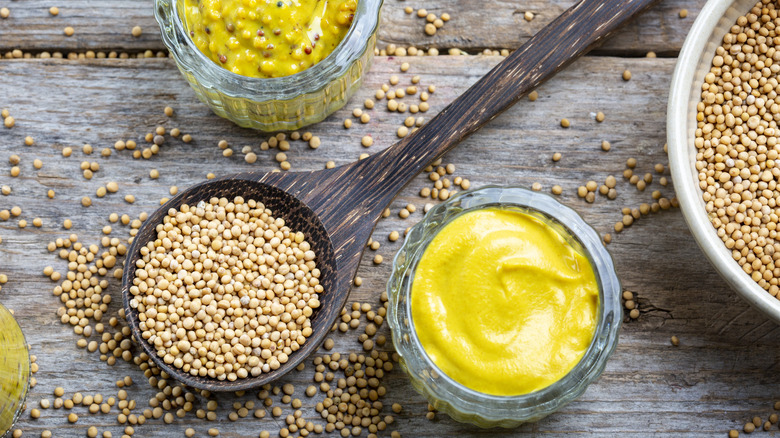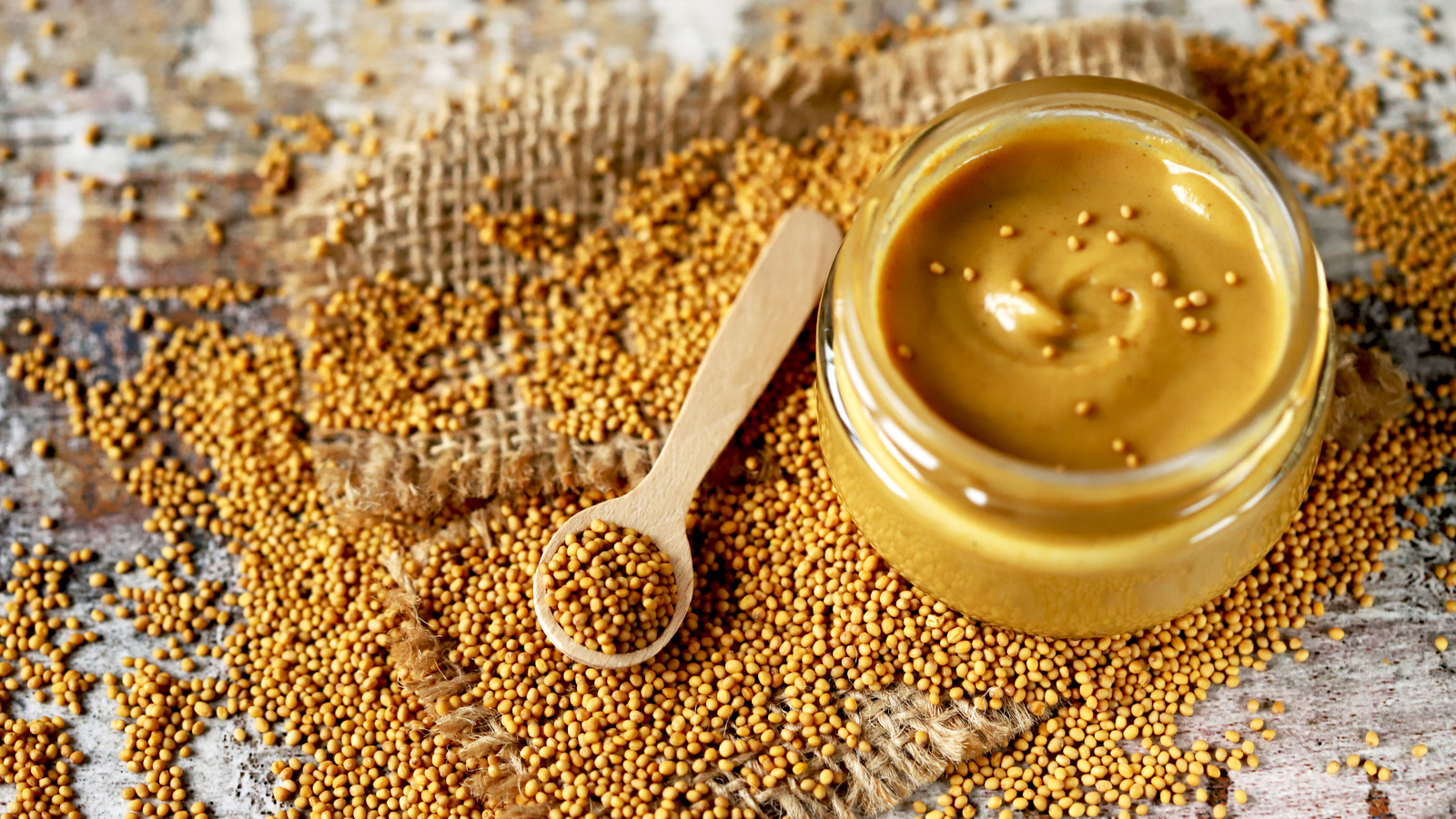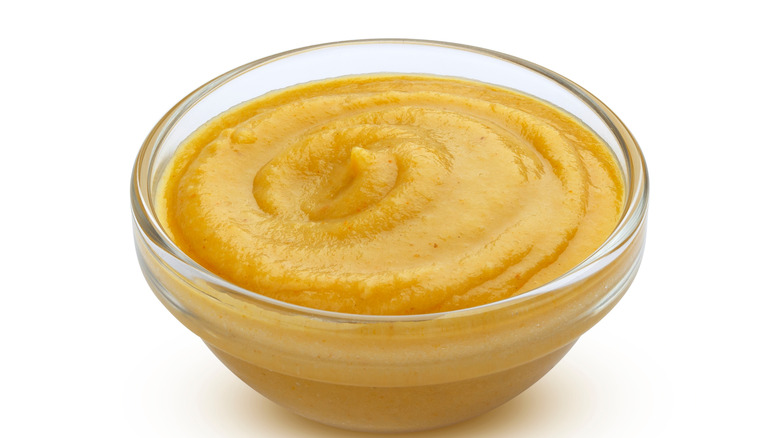Mustard On The Beat Hoe Meaning - What It Truly Signifies
Have you ever heard a certain phrase pop up in a song, catching your ear, and then you start to hear it everywhere? It’s a bit like a secret handshake in sound, a quick audio cue that signals something special. For many listeners, especially those who follow hip-hop, the line "Mustard on the beat, ho!" has become just such a recognizable sound. It’s a very specific sound bite, you know, that often kicks off a track, leaving some folks curious about its true importance and where it comes from.
This particular sound signature, a quick vocal snippet, actually belongs to a very well-known record producer. It's his way of putting his mark on a musical piece, a little audio signature that tells you he was there, making the music happen. You might find it at the very start of a song, or perhaps just as the beat truly gets going. It’s a rather common practice for music makers to have these personal audio stamps.
Recently, this phrase got a lot more attention, especially when a certain celebrated artist used it very clearly in one of his new tracks. This brought the sound byte to the ears of even more people, making them wonder about its history and what it truly means. It’s pretty interesting, actually, how a small sound can carry such a big story within the music world.
- Lainey Wilson Awards
- Why Does Mike Tyson Like Pigeons
- Cosmopolitan Swimming Pool
- Where Are The Chainsmokers From
- Ellen Page Young
Table of Contents
- What is the "Mustard on the beat hoe meaning" all about?
- Who is the person behind "Mustard on the beat hoe meaning"?
- How did the "Mustard on the beat hoe meaning" phrase come to be?
- Why do producers use a signature "Mustard on the beat hoe meaning" tag?
- What made Kendrick Lamar's use of "Mustard on the beat hoe meaning" stand out?
- Are there common misunderstandings about "Mustard on the beat hoe meaning"?
- Where else can you hear "Mustard on the beat hoe meaning"?
- The lasting impact of "Mustard on the beat hoe meaning"
What is the "Mustard on the beat hoe meaning" all about?
The phrase "Mustard on the beat, ho!" is, in simple terms, a unique sound mark. It’s a short vocal piece that a particular music maker uses in nearly all of the songs he helps create. You could say it is his audio signature, a way for him to sign his work, similar to how a painter puts their name on a finished picture. This little piece of sound is very much tied to his identity in the music world.
This distinct sound has become very well-known over time. It signals to listeners that they are about to hear, or are already hearing, a track that has been touched by this specific producer's sound. It’s almost like a brand name, but for your ears. You hear it, and you sort of know what kind of musical experience you are in for, typically.
For some, this phrase might seem a little mysterious at first, especially if they are new to the kind of music where these tags are common. They might wonder if it has some deeper hidden message, or if it’s just a random saying. But it's actually quite straightforward once you understand its purpose in the music production process, you know.
- Howard Kstern
- Noah Beck And Noah Centineo
- %C3%B0%C3%B0%C3%B0%C3%B1%C3%B0%C3%B0 %C3%B0%C2%BA%C3%B1%C3%B0%C3%B1%C3%B1%C3%B0%C3%B1%C3%B0%C3%B0
- %C3%B0%C3%B0%C3%B1%C3%B0%C3%B1%C3%B0%C3%B0 %C3%B0%C3%B0%C3%B1%C3%B0%C3%B1%C3%B0%C3%B1%C5%93 %C3%B1%C3%B0%C3%B0%C3%B1%C5%93%C3%B0%C3%B0%C3%B0%C3%B1%C5%93%C3%B1
- Polyamorous Law
The repeated use of this phrase, particularly in songs by a very famous artist, has made it a topic of conversation among music lovers. People sometimes talk about it online, sharing their thoughts and trying to figure out what it all means. It’s pretty cool how a few words can spark so much discussion, actually.
So, really, the "Mustard on the beat, ho!" sound is a producer's way of claiming his work. It's a quick announcement that he was involved in making the music you are enjoying. It’s a sound that has, in a way, become a part of the songs themselves, rather than just an add-on.
Who is the person behind "Mustard on the beat hoe meaning"?
The person responsible for this very famous audio signature is Dijon Isaiah McFarlane. He was born on June 5, 1990. Most people know him by his professional name, which is just Mustard. Before he shortened it, he was known as DJ Mustard. He is an American record producer and also a disc jockey, so he works with sounds in many different ways.
Mustard has made a big name for himself in the music industry. He is known for creating a particular kind of sound that has been very popular. His beats have a certain feel to them, often with a bouncy rhythm and simple, catchy melodies. This sound has helped shape a lot of popular music over the past years, you know.
He has worked with many different musical artists, helping them create their hit songs. His work often involves crafting the instrumental parts of a song, which are the foundations upon which vocalists build their performances. It’s pretty much a behind-the-scenes job, but a very important one for sure.
His distinctive sound, along with his audio tag, has made him one of the most recognizable producers around. When people hear that "Mustard on the beat, ho!" sound, they immediately think of him and the kind of music he makes. It’s a very strong connection between his name and his musical output, actually.
Personal Details of DJ Mustard
| Full Name | Dijon Isaiah McFarlane |
| Known As | Mustard (formerly DJ Mustard) |
| Born | June 5, 1990 |
| Nationality | American |
| Occupation | Record Producer, Disc Jockey |
How did the "Mustard on the beat hoe meaning" phrase come to be?
The origin of the "Mustard on the beat, ho!" phrase is quite interesting, actually. It wasn't something Mustard himself said initially. The sound bite is sampled, meaning it was taken directly from another piece of audio. Specifically, it comes from the voice of a rapper named YG. This is a very common practice in music production, you know, to use small pieces of existing sounds.
This particular sound was first heard at the very end of YG’s track called "I’m Good," which came out in March 2011. So, it has been around for quite a while now. It was during the early days when YG and DJ Mustard were working together that this idea for the tag came about. They were collaborating on music, and this little sound piece was born from that creative partnership.
Mustard himself has shared stories about how he created this well-known tag. It wasn't just a random choice; it was something thought out to be his unique stamp. The idea was to have something short and memorable that would let everyone know who produced the track. It's a rather simple concept, but it works very effectively.
So, in essence, the phrase is a piece of audio history, a sound that came from a collaboration between two artists. It became Mustard’s personal mark because it was a catchy and clear way to identify his work. It’s pretty cool how these small details become so important in the music world, you know.
The tag acts as a kind of audio signature that is now instantly recognizable. It’s a testament to how creative decisions, even small ones, can have a lasting impact on a producer's career and public image. This particular sound is, in some respects, as famous as many of the songs it appears in.
Why do producers use a signature "Mustard on the beat hoe meaning" tag?
Producers use these signature tags for several good reasons. One of the main ones is simply to claim their work. Think of it like an artist signing their painting. When a producer spends hours crafting a beat, they want people to know it was their creation. A tag like "Mustard on the beat, ho!" is a quick, unmistakable way to do that, you know.
Another reason is for branding. In the music industry, it's very important for producers to build their own identity. When listeners consistently hear a specific tag before a great song, they start to associate that sound with quality and a particular style. This helps the producer build a reputation and become more recognizable, which is pretty useful.
These tags also serve as a form of promotion. Every time a song with a producer's tag plays, it's like a mini advertisement for their services. It tells other artists, record labels, and fans who is behind the sound they are enjoying. It’s a rather clever way to get your name out there without having to say much, actually.
Furthermore, producer tags can add to the overall feel of a song. They can set a mood or create a sense of anticipation right at the beginning. The "Mustard on the beat, ho!" tag, for instance, often signals a certain type of energetic, rhythmic sound is about to begin. It’s almost like a little warm-up for the ears, in a way.
So, while it might seem like just a small sound, these tags are actually a very important part of a producer's toolkit. They help with recognition, branding, promotion, and even the artistic presentation of the music itself. It's a simple, yet very effective, strategy that many successful music makers use, you know.
What made Kendrick Lamar's use of "Mustard on the beat hoe meaning" stand out?
Kendrick Lamar's use of the "Mustard on the beat, ho!" phrase in his song "Not Like Us" really caught people's attention. The text mentions that in the first few seconds of this particular track, it kicks off with "psst, I see dead people" followed by "Mustard on the beat, ho," which then repeats. This very clear and prominent placement made it stand out, you know.
For many listeners, especially those who might have heard the tag before but never really focused on it, Kendrick's clear delivery brought new light to the phrase. Some people had even misheard the tag in other songs or skipped over it when reading lyrics online, thinking it was just a generic catchphrase. But here, it was undeniable, actually.
Kendrick's way of saying it, so distinctly and early in the song, made people pay closer attention to it. It was almost as if he was purposefully highlighting the producer's contribution, bringing the background element to the forefront. This made fans wonder about its meaning and history more than ever before, which is pretty cool.
The fact that it was part of such a popular and talked-about song also helped. When a track gets a lot of plays and discussions, every little detail within it gets examined more closely. The "Mustard on the beat, ho!" phrase, therefore, became a point of interest for many listeners who were already deep into the song's context. It just added another layer to the listening experience, you know.
So, Kendrick Lamar, with his very precise way of speaking, kind of enlightened some fans about the tag. He made it impossible to ignore, which in turn led to more people looking into its origins and the producer behind it. It’s a good example of how one artist can draw attention to the work of another, even through a small sound bite.
Are there common misunderstandings about "Mustard on the beat hoe meaning"?
Yes, there are definitely some common misunderstandings about the "Mustard on the beat, ho!" phrase. One of the most frequent ones mentioned is people mishearing it as "murder on the beach." It’s pretty common for listeners to sometimes misinterpret lyrics or vocal tags, especially when they are quick or not perfectly clear, you know.
This kind of mishearing can lead to a lot of confusion, as "murder on the beach" has a very different meaning and feel than "Mustard on the beat, ho!" People might wonder if the song is about something dark or violent, when in fact, it's just a producer's signature. It's a rather funny mix-up, actually, but it happens.
Another misunderstanding comes from not knowing what a producer tag is in the first place. Some people might think it's just a random shout-out or a nonsensical phrase added to the song. They might not realize it's a deliberate mark of authorship, similar to how DJ Khaled often shouts his name in his songs. It’s a very specific kind of musical convention.
Because the phrase repeats in some songs, and because it might not always be the clearest sound depending on the mix, listeners can sometimes overlook its true purpose. They might just skip over it when reading lyrics online, assuming it's just filler or an artist's personal catchphrase that doesn't mean much. This is why Kendrick Lamar's clear pronunciation was so important, you know.
So, these misunderstandings often come from a lack of familiarity with producer tags or simply from the way the human ear sometimes processes quick sounds. But once you know the real story behind "Mustard on the beat, ho!", it becomes much clearer and less prone to misinterpretation. It's pretty interesting how context changes everything, in a way.
Where else can you hear "Mustard on the beat hoe meaning"?
You can hear "Mustard on the beat, ho!" in a huge number of songs, actually. This is because DJ Mustard has an incredibly extensive list of production credits. He has produced tracks for many, many different artists across the music scene. So, if you listen to popular music, especially hip-hop from the last decade, chances are you've heard his signature sound quite a bit, you know.
The phrase is said at the beginning of almost every song that DJ Mustard makes the beats for. It's his consistent way of marking his work, so it appears in collaborations and solo tracks alike. This means his tag has become a familiar sound across a wide range of musical projects, which is pretty cool.
Because he has worked with so many well-known musical acts, his tag has traveled far and wide. It's not just limited to one artist's discography; it's spread across the albums and singles of numerous performers. This widespread presence makes his tag one of the most recognized in modern music, in some respects.
You might find it in the intro of a high-energy party song, or perhaps setting the stage for a more laid-back track. The consistent appearance of the tag means that if you're a fan of the sound that Mustard creates, you'll hear his calling card often. It's a very reliable indicator of his involvement, actually.
So, the "Mustard on the beat, ho!" phrase is not just a one-off sound. It's a recurring element in a vast collection of music, a true acoustic signature that signals the presence of a very prolific producer. It's a pretty good example of how a small sound can have a very big reach across the music landscape, you know.
The lasting impact of "Mustard on the beat hoe meaning"
The "Mustard on the beat, ho!" phrase has left a very noticeable mark on music culture. It's not just a simple sound bite; it has become an iconic part of many people's listening experience. Its consistent presence has made it instantly recognizable, almost like a separate character in the songs themselves, you know.
One of the important things about Mustard's beat style was how he created a new, easily usable groove. His signature tag, voiced by YG, became a central part of this new sound. It helped define an era of popular music, with its bouncy rhythms and catchy elements. This sound was, in a way, very influential for a time.
The phrase has also become a part of internet culture, sparking discussions and even funny pictures or videos online. People talk about it, share their experiences of hearing it, and create content around it. This shows how a small piece of audio can extend its reach beyond just the music itself and into wider cultural conversations, which is pretty interesting.
For many fans, hearing the tag brings a sense of familiarity and excitement. It signals the start of a particular kind of musical vibe that they enjoy. It's almost like a promise of good music to come, a signal that the beat is about to drop in a way that only Mustard can deliver. This creates a strong connection with his audience, actually.
So, the "Mustard on the beat, ho!" tag is more than just a producer's signature. It represents a sound, an era, and a cultural moment in music. It's a lasting piece of audio that continues to be heard and talked about, showing the enduring power of a simple, well-placed sound. It's pretty clear that this phrase has carved out its own special spot in music history, you know.
- Elliot Page Dulu
- Jordan Dungy
- Donkey Smiling
- Why Does Mike Tyson Like Pigeons
- %C3%B1%C3%B1%C3%B0%C3%B0%C3%B0%C3%B0%C3%B1%C3%B0%C2%B5%C3%B0%C3%B1%C5%93 %C3%B0%C2%BA%C3%B0%C2%B5%C3%B0%C3%B1%C3%B0%C3%B0%C3%B0

A Guide To All The Different Kinds Of Mustard

How Mustard Got Its Name

A Guide To All The Different Kinds Of Mustard